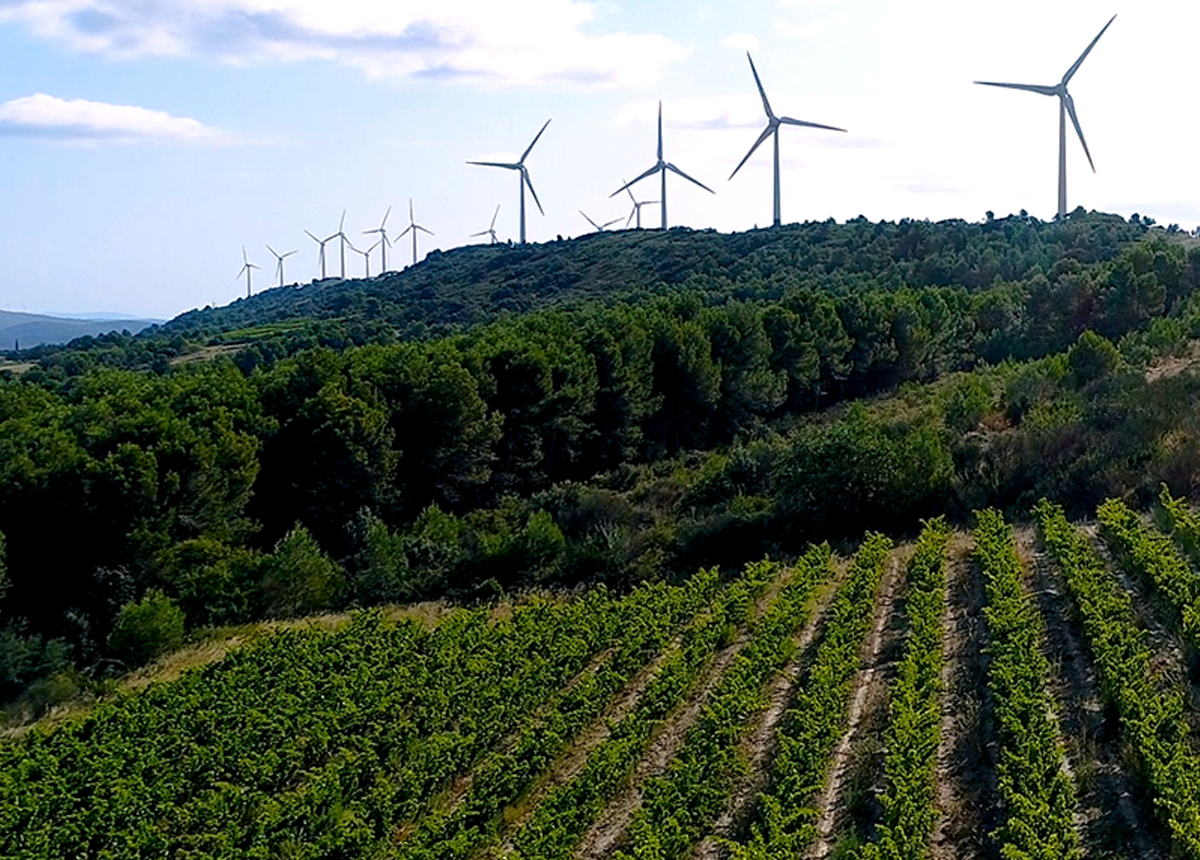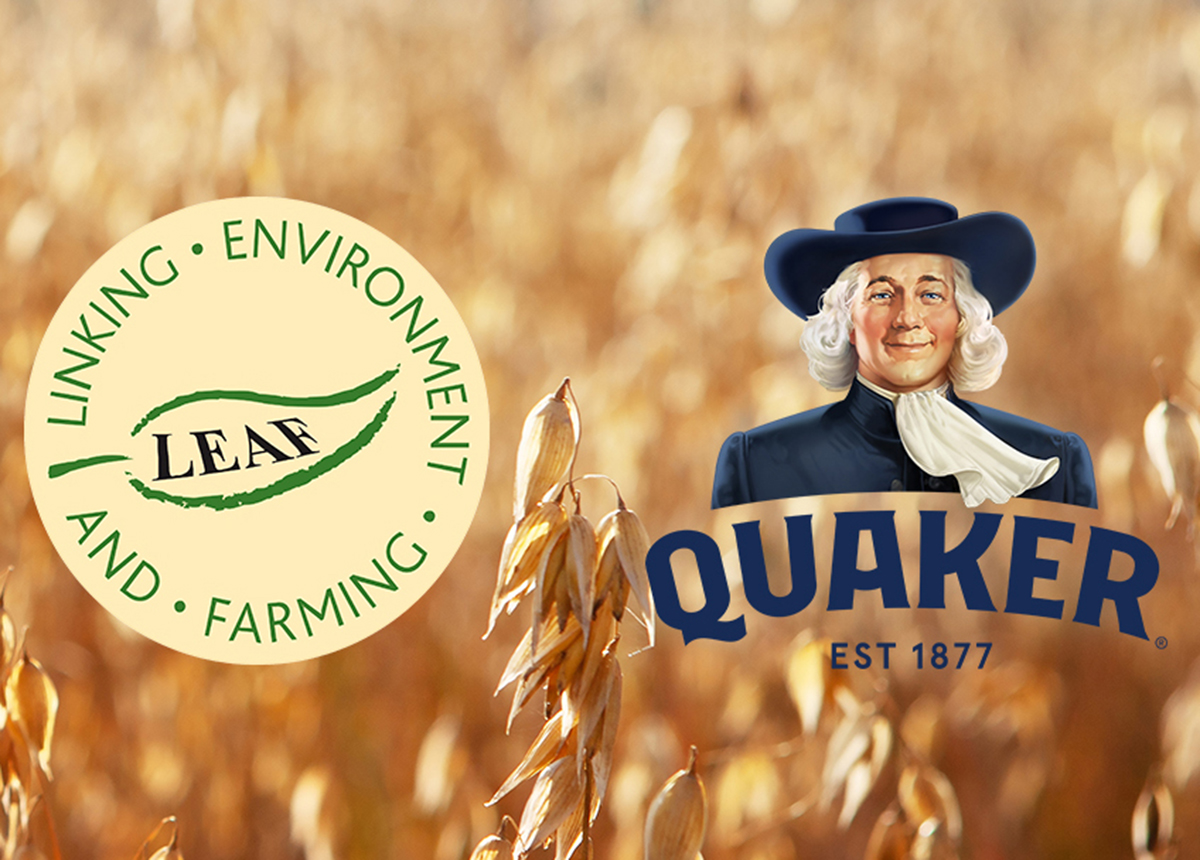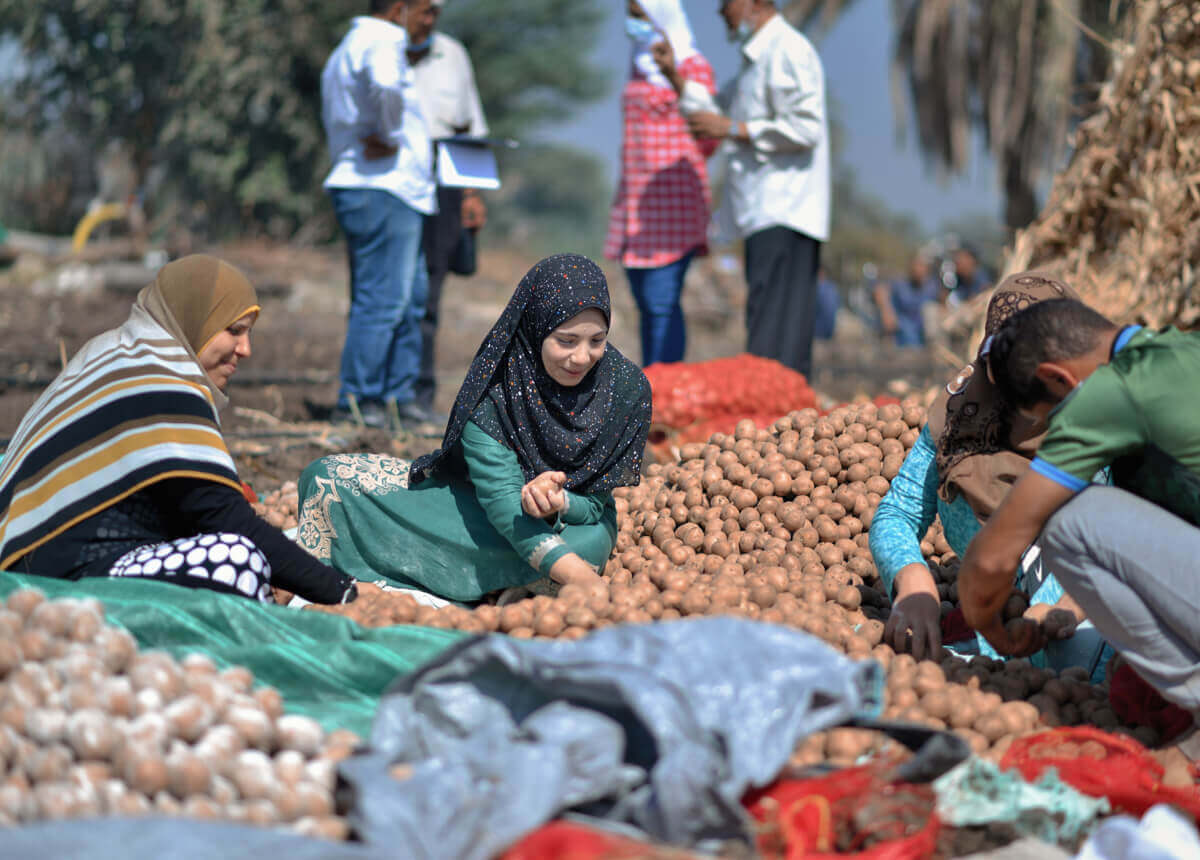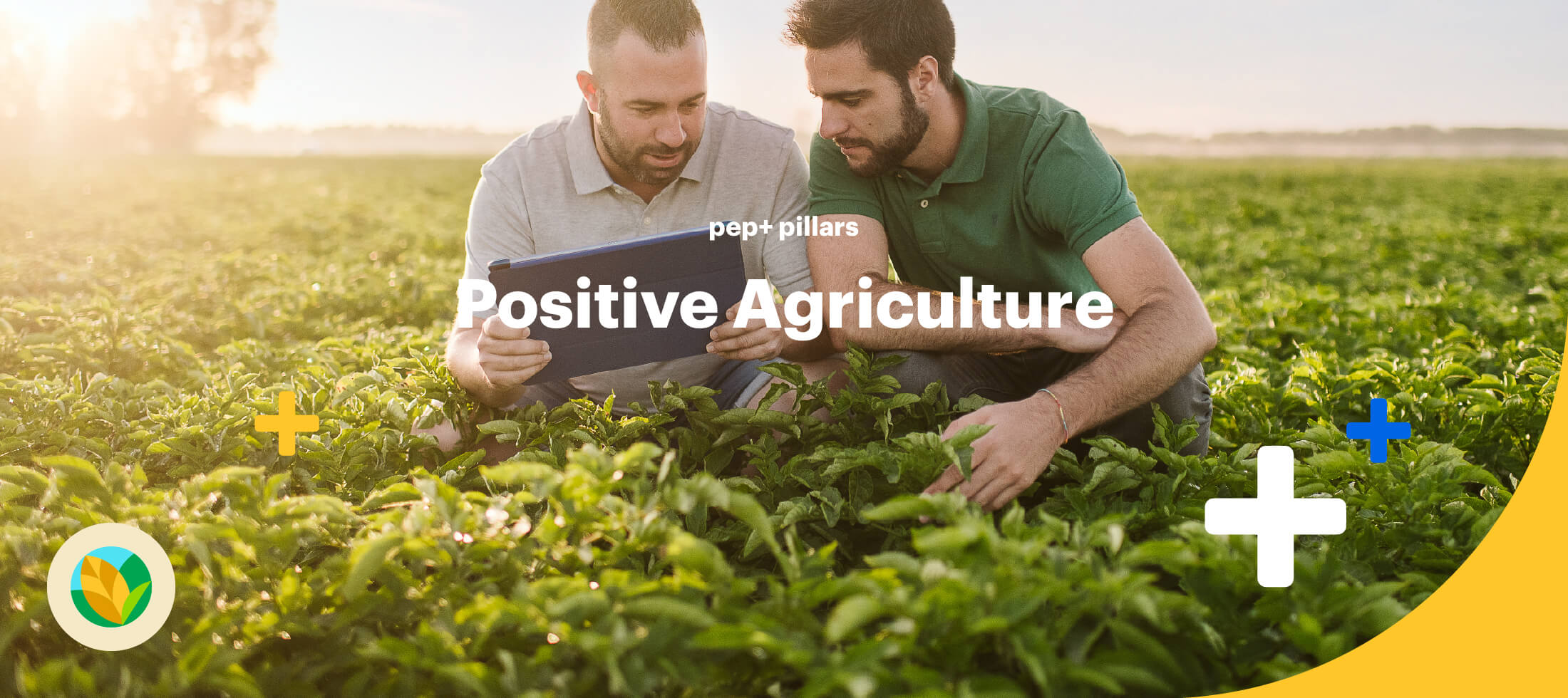
PepsiCo’s business starts with agriculture. A steady, sustainable supply of crops is central to our business.
Our agricultural footprint covers approximately 7 million acres, and our supply chain supports more than 100,000 agricultural jobs worldwide. We work with tens of thousands of farmers to source more than 25 crops and ingredients from more than 30 countries around the world.
The goal is a sustainable food system that respects natural resources and makes a positive impact on the people and communities we work with and serve. It’s better for people, better for the planet and better for our business.
We are taking a landscape approach to advancing regenerative agriculture, marked by collaboration between stakeholders within a designated region — often spanning multiple crops, sectors and land uses — to advance shared sustainability goals while reconciling and optimizing multiple social, economic and environmental objectives. And because real change requires long-term, consistent effort, we have launched several initiatives tackling some of our key commodities with this approach in the Midwest U.S., Mexico and Southeast Asia, and plan to expand into new priority landscapes as we progress on our Positive Agriculture journey.
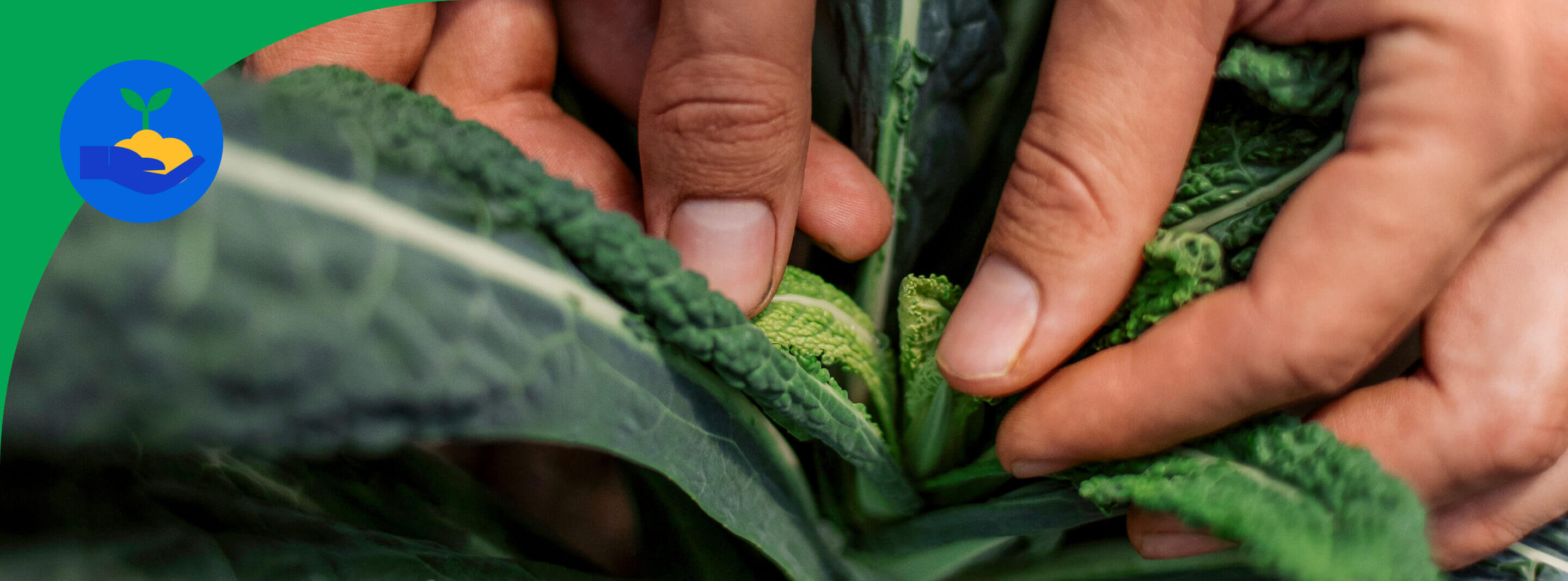
Agriculture
Agriculture
Climate-related impacts like excessive heat, drought or flooding can impact farm yield and productivity. So we’ve taken steps designed to source our crops in ways that respect natural resources, strengthen farming communities and ensure a secure supply of ingredients for our products.
We’re supporting regenerative agricultural practices that aim to make soil healthier, sequester carbon, improve watershed health and biodiversity, and strengthen farmer livelihoods. We’re working closely with our farmers and intermediary suppliers to embed these practices throughout our agricultural supply chain.
Our footprint
We’re using our scale, influence and expertise to do more than just reduce our own impact. Our strategy prioritizes investment, innovation and collaboration with our farming partners and suppliers to deliver positive impact around the world.
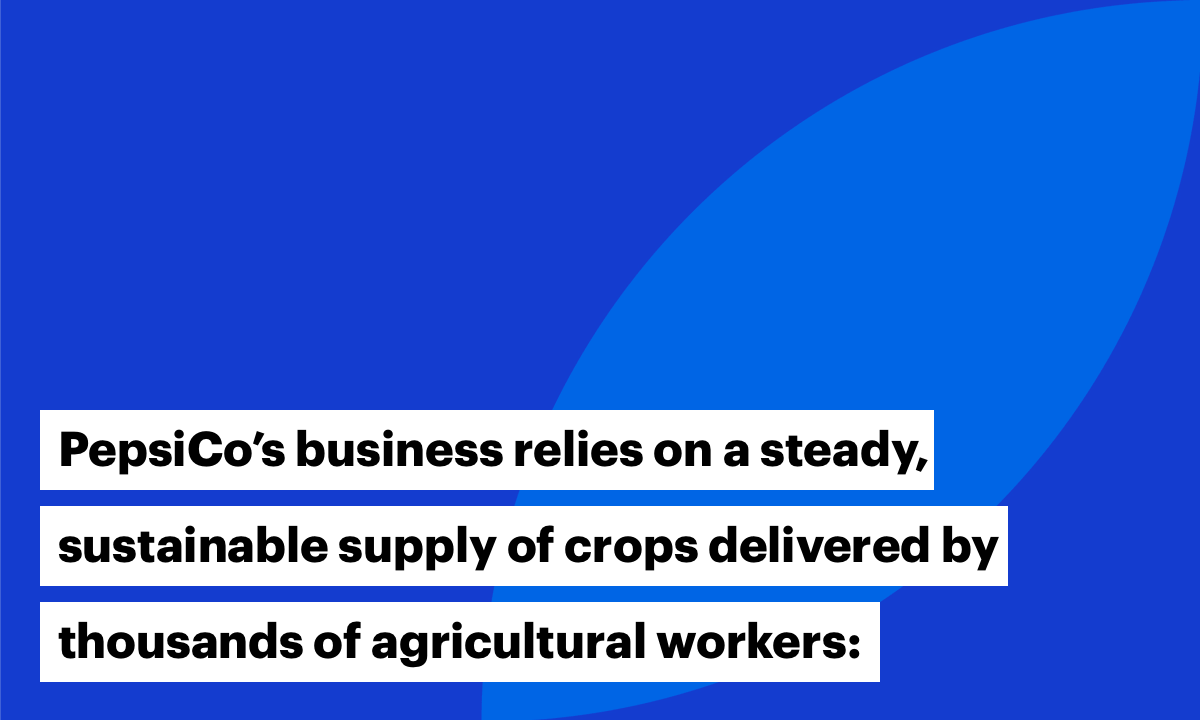
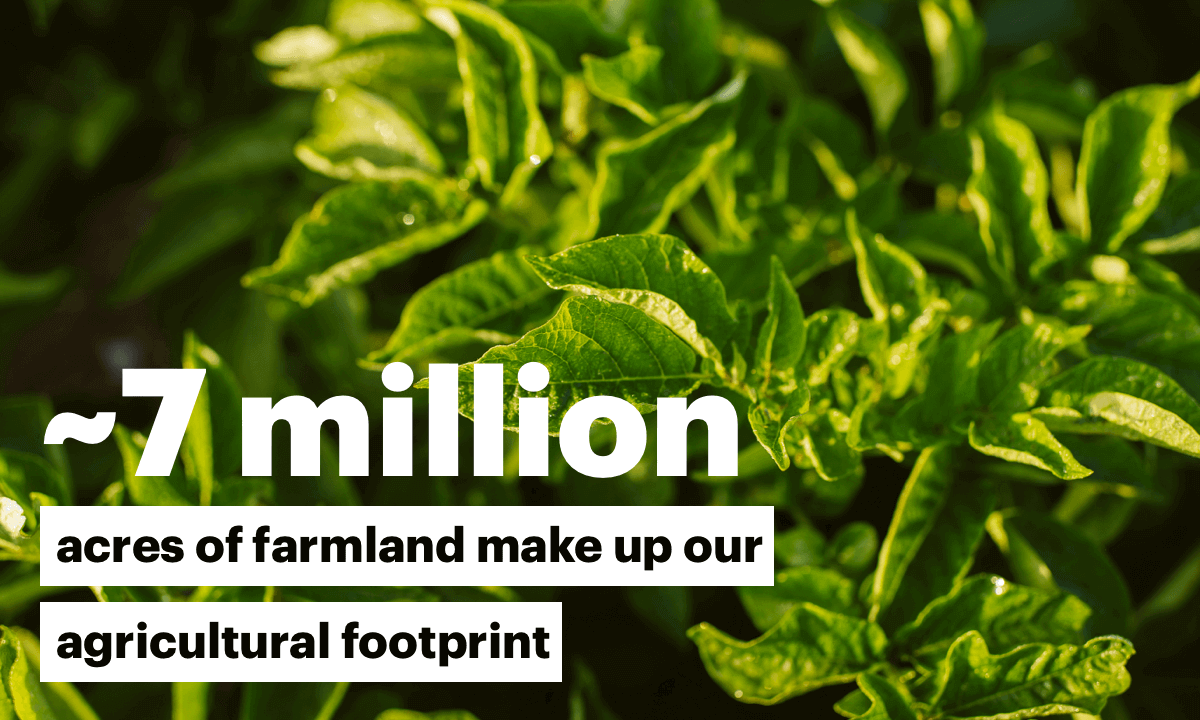
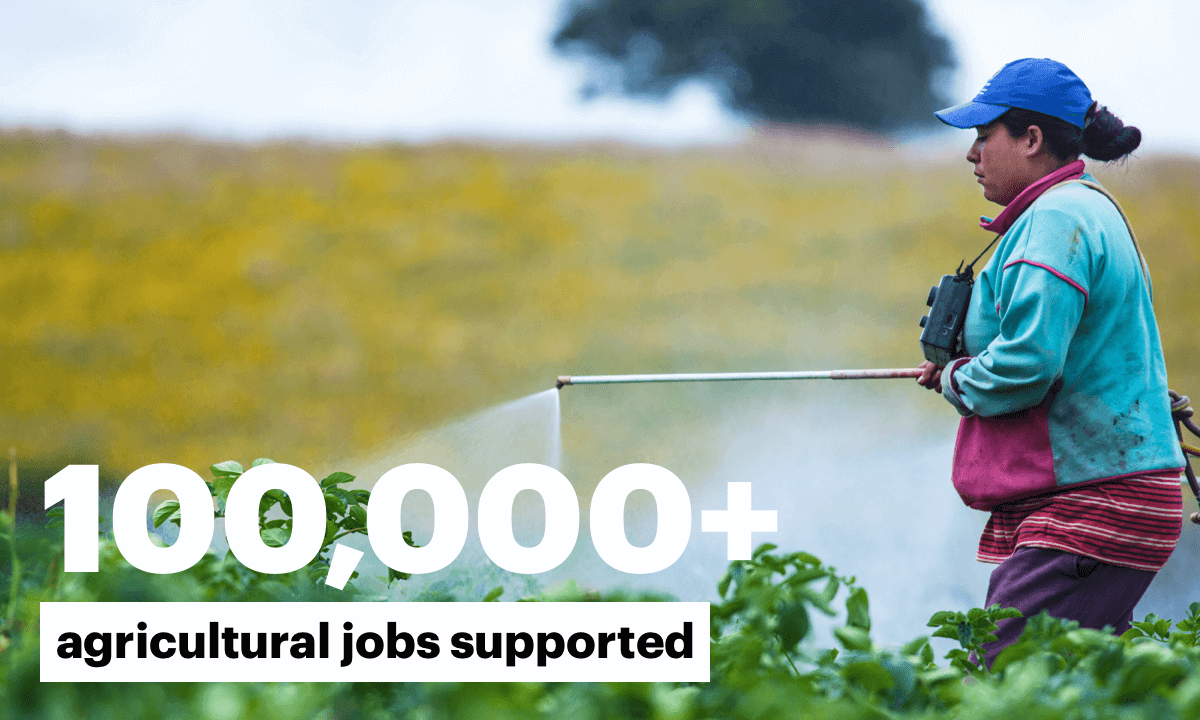
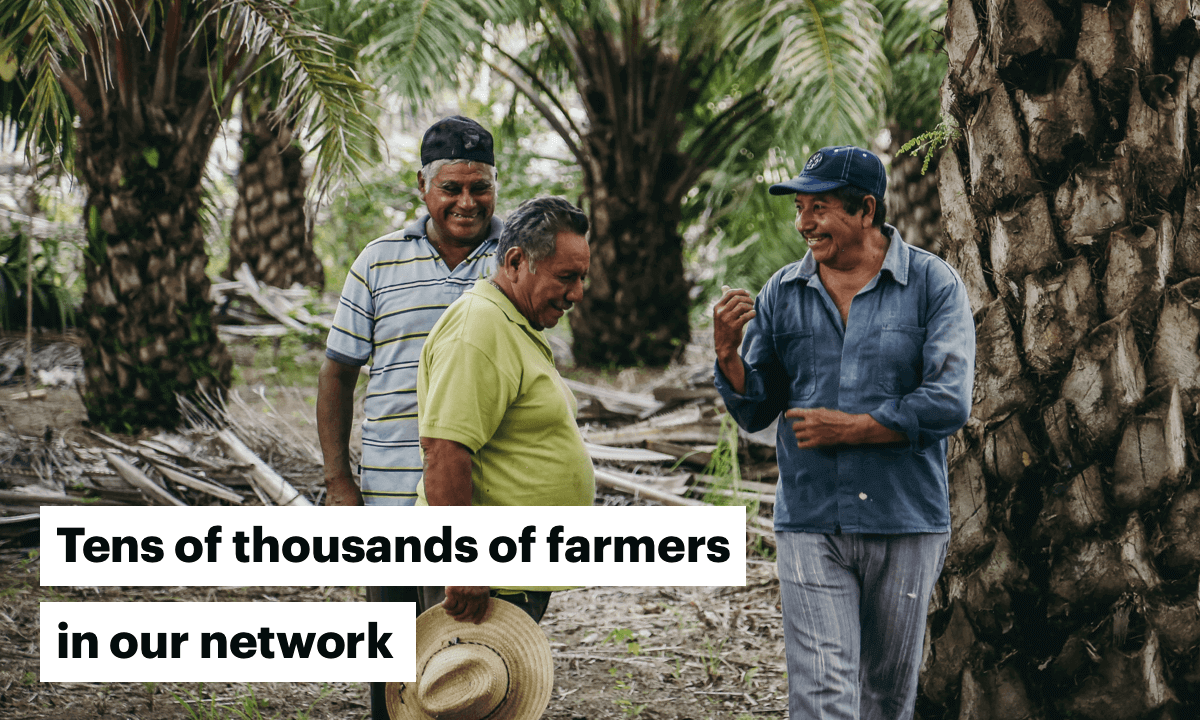
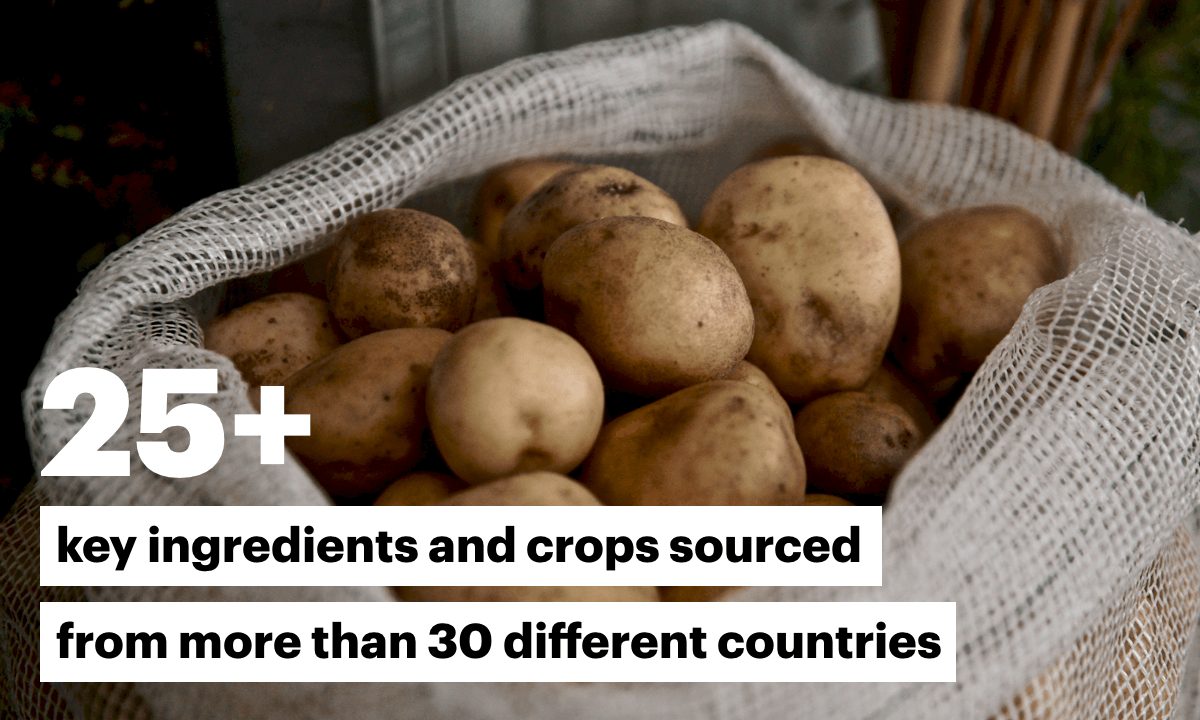
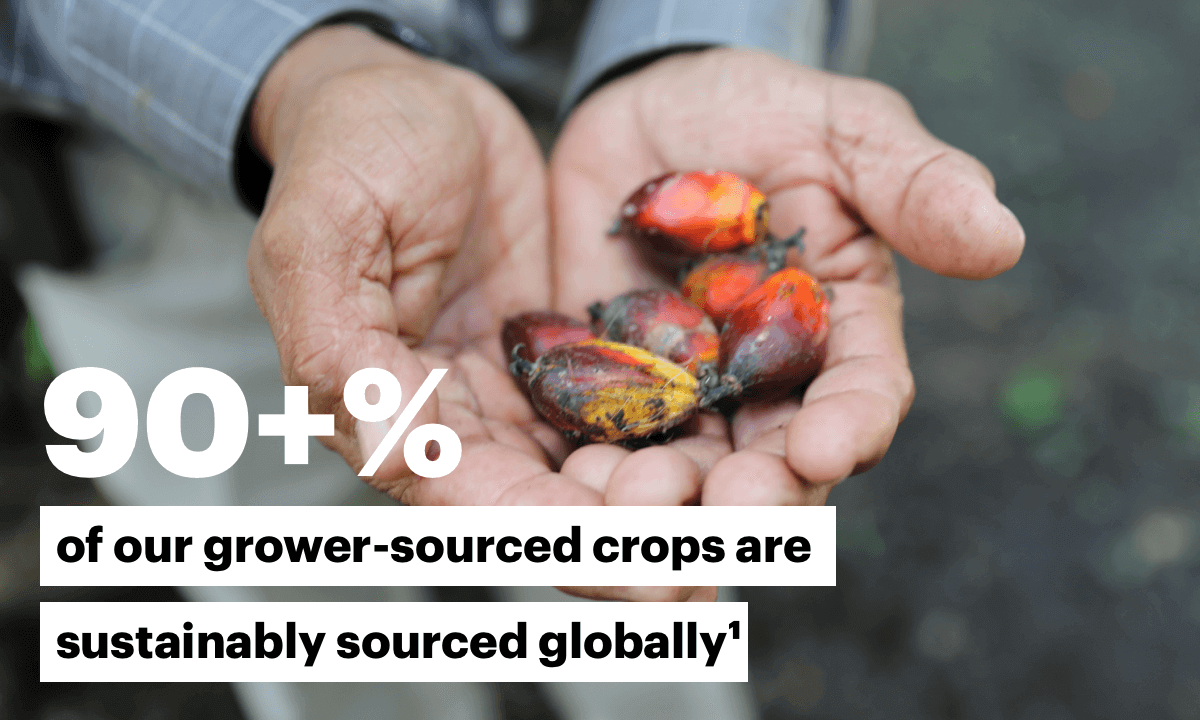
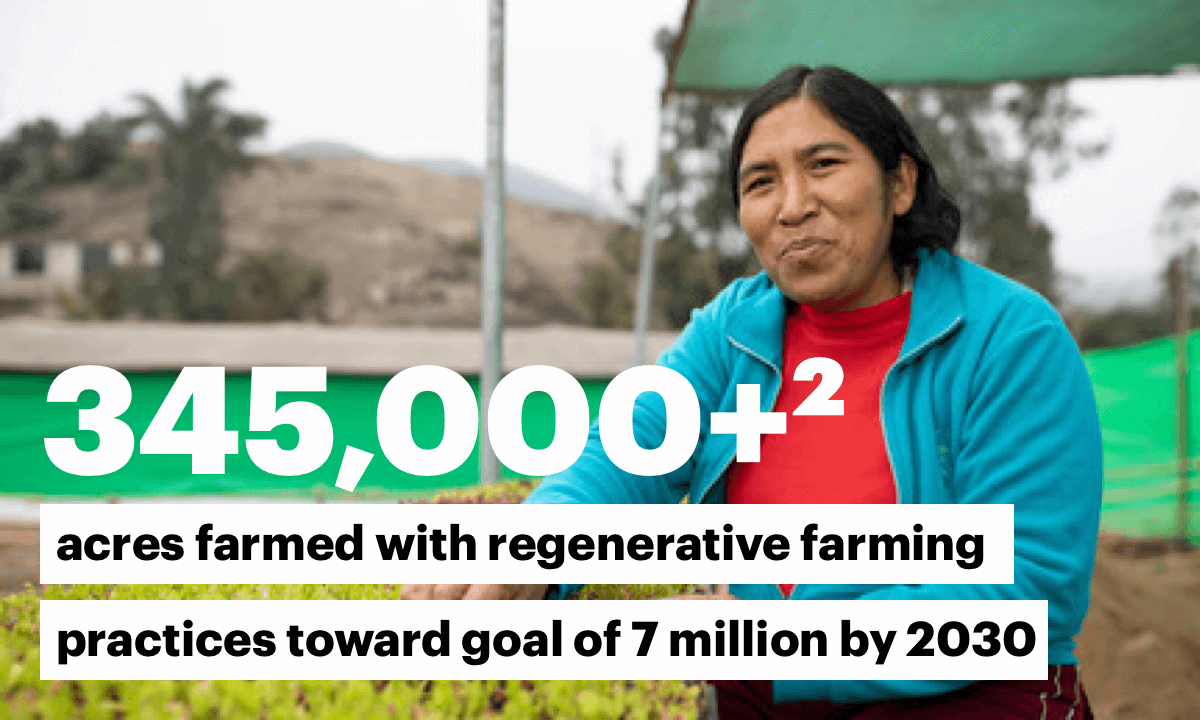
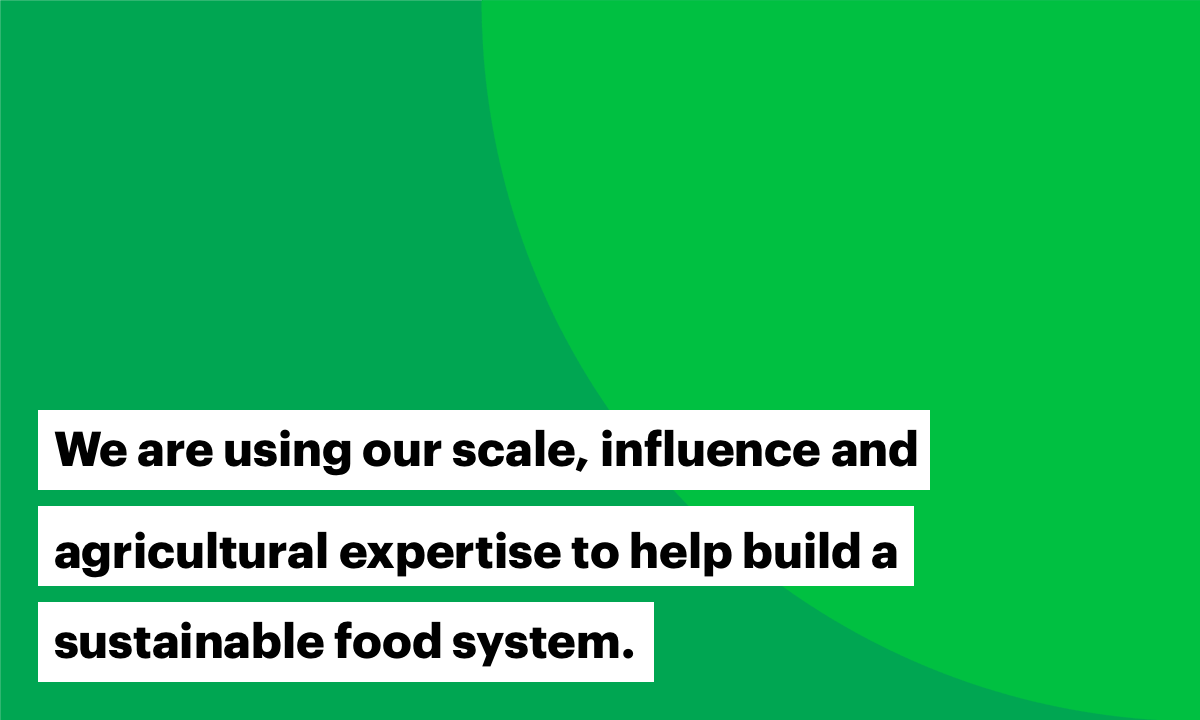
2. Regenerative acres reported for 2021 include U.S. and Canada only. Regenerative acres demonstrate measured improvement in sequestering carbon to reduce GHG emissions AND at least one other of the following: improved soil health, improved watershed health, improved biodiversity or improved livelihoods.
Goals & progress
Source our crops and ingredients in ways that restore the earth and strengthen farming communities.
Regenerative agriculture goal
![Spread the adoption of regenerative agriculture practices across 7 million acres, approximately equal to 100% of the land used around the world to grow our crops and ingredients for our products [footnote 1]](https://usa-pepsicoredesign-global-prod.pepext.com/images/default-source/sustainability/2021-esg-summary/pepsico_esg21_chart_agriculture-regenerative-agriculture-goal.png)
2. PepsiCo introduced — and began to measure — its new regenerative agriculture metric in 2021. Progress presented here reflects our first year tracking this metric and builds on years of partnership and investment in sustainable agriculture.
Approach
We define regenerative agriculture1 as a set of farming principles and practices that improve and restore ecosystems while building resilience. Our approach is outcome-oriented, and to some extent, we are practice agnostic. That’s because every farming community is different, with different needs. We’re tracking how soil health, greenhouse gas (GHG) emissions reduction and carbon sequestration, watershed management, biodiversity and the livelihoods of agricultural workers are improving. There are some practice categories we’ve identified that help drive those results, and we are working on scaling them.
![Up to a 38% net reduction in on-farm GHG emissions through use of cover crops [footnote #2]](https://usa-pepsicoredesign-global-prod.pepext.com/images/default-source/sustainability/2021-esg-summary/pep-pillars-agriculture-regenerative-goal-stat1.png)
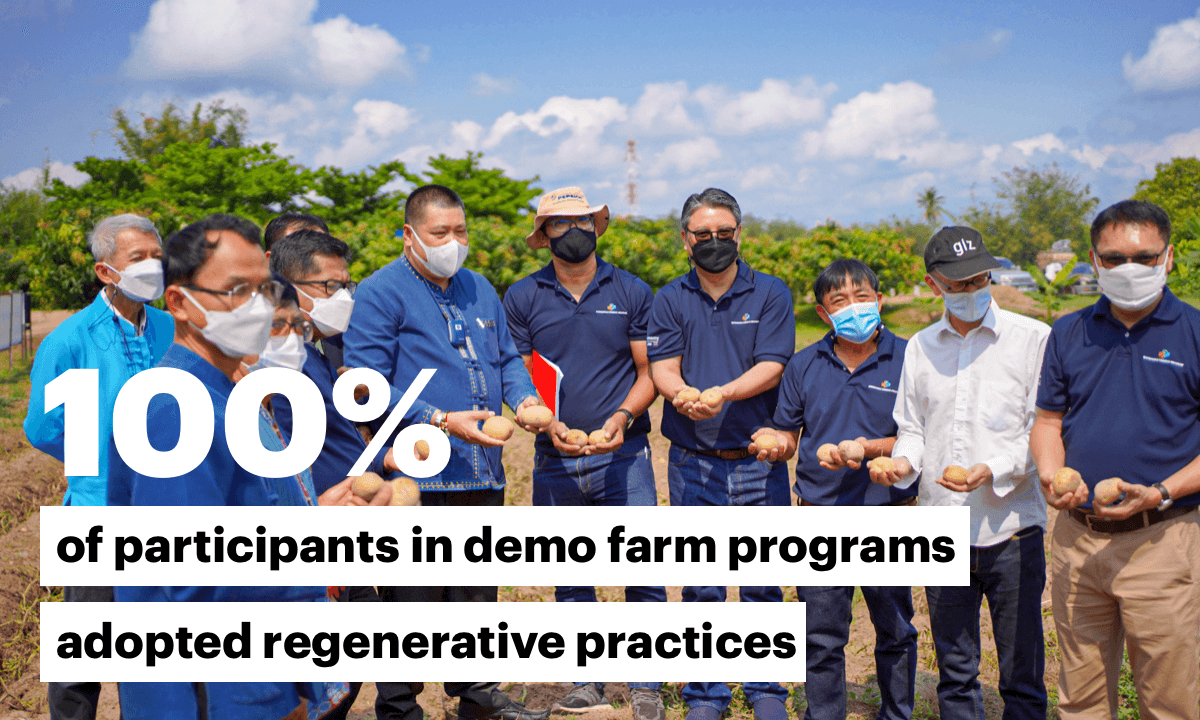
2. In the U.S., we helped farmers plant cover crops on over 85,000 acres, an example of how using this regenerative agriculture practice can result in up to a 38% net reduction in on-farm greenhouse gas (GHG) emissions, including soil carbon sequestration.
Regenerative techniques not only protect against soil erosion and water depletion, but they can also help farmers grow more food on the same amount of land. These techniques typically require fewer inputs, so they can also lead to higher margins and greater profitability for our farmers.
In 2021, we launched an internal co-investment fund to incentivize our local teams to design and scale innovative solutions that contribute to our Positive Agriculture agenda. Now in its second year, the Positive Agriculture Outcomes Fund provides a unique mechanism that reduces the risk and cost of projects with long-term sustainable business potential. To date, nearly $2 million has been granted through the Fund.
In addition, we understand societal concerns around pesticides and are actively seeking continuous improvements in agricultural practices that minimize pesticide and other agrochemical use. We established a cross-functional Global Pesticide Council composed of senior leaders across key functions to evaluate pesticide issues and direct the Company’s policies and programs. The Council has developed a five-year strategic plan with clear deliverables, including industry benchmarking, and centralized global scientific and regulatory tracking. We also engage with multi-stakeholder groups, peer companies and NGOs to develop, promote and adopt best practices related to responsible use of pesticides.
What is regenerative agriculture?
Our 72 demonstration farms show the benefits of regenerative farming techniques
What we do
 Build soil health and fertility
Build soil health and fertility- Rebuild organic matter
- Train farmers for on-field agronomy
- Use resource-efficient/compost fertilizers
- Plant multiple crops in same field
Build soil health and fertility Reduce and sequester CO2
Reduce and sequester CO2- Plant cover crops to sequester CO2 underground
- Promote reduced and no-till cultivation for minimal soil disturbance
- Systemic crop and livestock rotation
Reduce and sequester CO2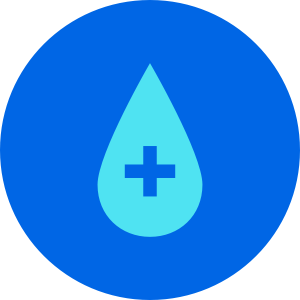 Introduce water efficiency techniques
Introduce water efficiency techniques- Help farmers access more efficient irrigation equipment
- Support best practices for scheduling and maintenance
- Transition from flood irrigation to more efficient methods (i.e., drip irrigation and “fertigation”)
Introduce water efficiency techniques Protect and enhance biodiversity
Protect and enhance biodiversity- Commitment to no deforestation
- Pollinator strips on farms
- Soil microbe breeding
- Use of natural pesticides
Protect and enhance biodiversity Improve farmer livelihoods
Improve farmer livelihoods- Teach most vulnerable farms in supply chain
- Support women farmers economically
- Source directly from growers whenever possible
- Protect workers’ rights
Improve farmer livelihoods
How it helps
 Improve and restore natural ecosystems
Improve and restore natural ecosystems Increase crop yields by growing more food on the same amount of land
Increase crop yields by growing more food on the same amount of land Feed more people with fewer inputs
Feed more people with fewer inputs Improve farmer livelihoods through higher sales margins and greater profitability
Improve farmer livelihoods through higher sales margins and greater profitability Net reduction of on-farm GHG emissions
Net reduction of on-farm GHG emissions
In collaboration with our internal experts, industry peers and cross-sector partners, we have developed a practice bank of those activities and practices that contribute to our Regenerative Agriculture goals, a database that we introduced in May 2022 to our farmers and suppliers.
Climate resilience is also a key priority to safeguard our operations for many years to come.
It’s the reason why we joined forces with several strategic partners worldwide to understand the specific needs to fight climate change in every sector in which we operate.
Alongside organizations such as CIAT (International Center for Tropical Agriculture), GIZ, Foundation for Food and Agriculture Research, U.S. Farmers and Ranchers Alliance, World Farmers’ Organization, AgroScout and others, we are supporting farmers to implement adaptive practices, reduce GHG emissions in agriculture and strengthen their field knowledge and management to respond quickly in a targeted way so we can all continue driving the pep+ agenda forward.
We actively support farmers in our supply chain with programs to make it easier for them to adopt regenerative practices. In the U.S., we helped farmers plant cover crops on over 85,000 acres, resulting in up to a 38% net reduction in on-farm GHG emissions, including soil carbon sequestration1 and provided support to more than 600 farmers in North American farmland by the end of 2021.
Our demonstration farms program showcases practices that are leading to the commercialization of innovative ag-tech and the scaling of proven practices that lead to regenerative outcomes. The demonstration farms enable the farmers we work with to share their firsthand experiences, which encourages broader adoption. In 2021, we worked with 20 different partners to demonstrate farming best practices in areas such as nutrients, water-use efficiency and precision farming.
In 2021, our partnerships yielded value for farmers, the environment and the business (percent increases observed in a control plot vs a demonstration plot):
- In 28 demonstration farms in India, we saw average yield improvements of almost 7% and reduced GHG emissions by more than 7%, resulting in farmer income increase of $55 per acre on average.
- In Thailand, we worked with the Department of Agriculture and other partners to implement integrated pest and nutrient management and install drip irrigation systems on our demonstration farms, resulting in an average yield increase of 25% (on seven farms), a 23% carbon emissions reduction and a more than 40% reduction in water use in irrigation.
- In Mexico, we demonstrated ways to save water through different irrigation techniques and improvements in existing irrigation systems. We reduced water use in irrigation by 36% on average while increasing potato yields by 8%.
By the end of 2021, we had 72 regenerative demonstration farms as part of the program and over 600 farmers transitioned from demonstration into broader “landscape” impact programs to scale up proven innovation.
In a landscape approach, farmers in a region align around shared sustainability goals and commit to specific regenerative practices. PepsiCo and our partners support work within the landscape to spread the adoption of regenerative agriculture and deliver outcomes, such as GHG emissions reduction, through funding independent advisories for farmers, facilitating coaching and peer support and financially incentivizing adoption of regenerative practices.
As we advance on our Positive Agriculture journey, and more farms learn the benefits of regenerative agriculture and adopt its practices, we expect to continue to expand into new landscapes and grow the number of regenerative farming acres we annually report toward our goal of 7 million by 2030. In 2021, we launched several landscape initiatives tackling some of our key commodities in the Midwest U.S., Mexico and Southeast Asia.
1. For PepsiCo's corporate GHG footprint, the company follows the GHG Protocol framework where any sequestration is kept separate from the three scopes of emissions.
Healthy watershed goal
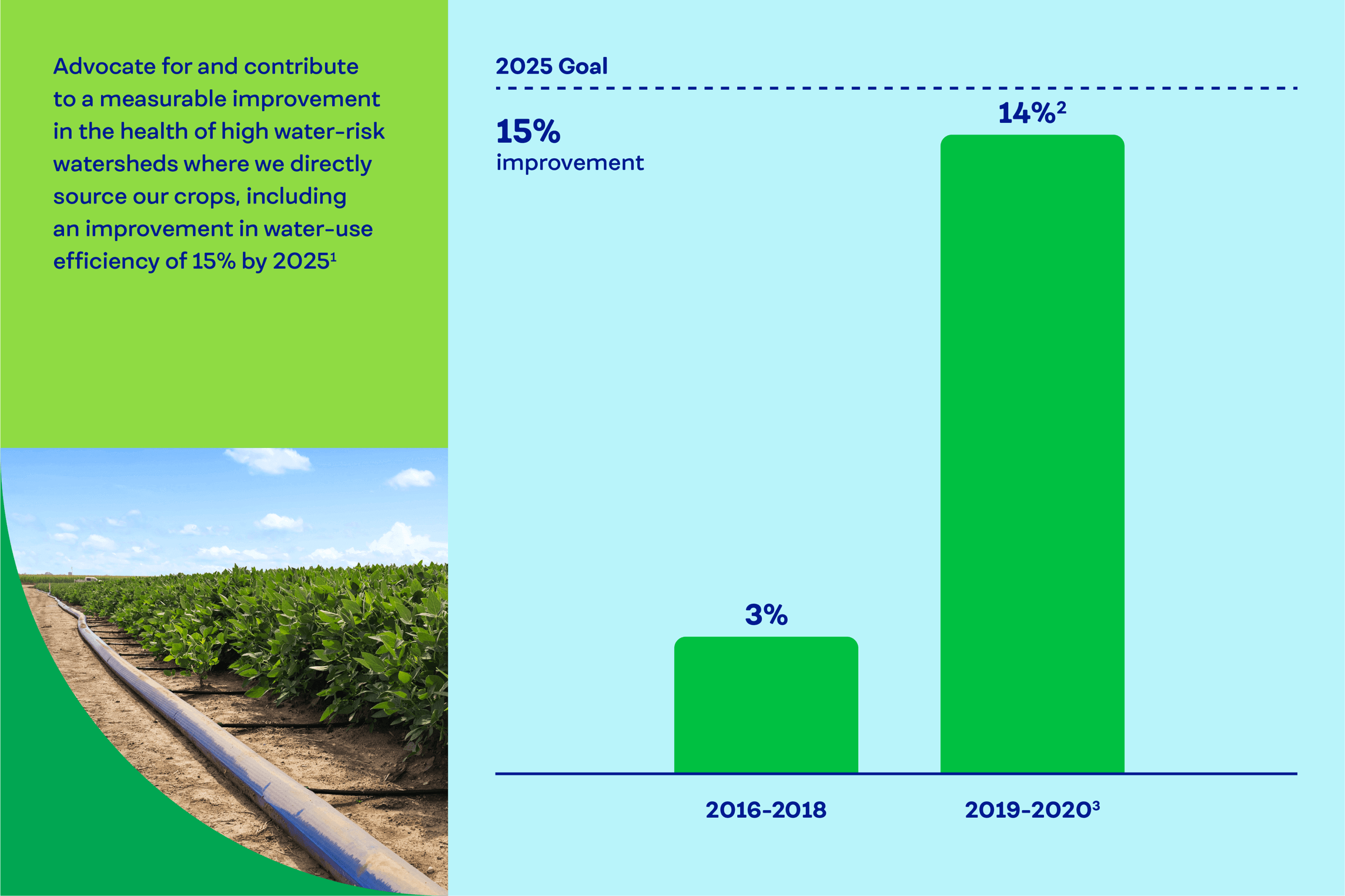
2. Results reflect the exclusion of Pioneer Foods , BFY Brands, Inc. (BFY) and Hangzhou Haomusi Food Co., Ltd. (Be & Cheery).
3. Data for 2021 not available, as we measure this at least every three years.
Approach
Through advocacy and our own initiatives (including promoting regenerative techniques), we’re working to measurably improve the health of high water-risk watersheds where we directly source our crops and aim for a more sustainable way to use this resource. At the end of 2021, we sourced approximately 40% of our grower-sourced key ingredients — the building blocks of our beverages and convenient foods — from areas of high water-risk. These efforts are designed to help ensure our continued access to the water we need for production as well as preserve water access for the communities in which we operate. We’ve targeted a goal of improving water-use efficiency by 15% by 2025, compared to a 2015 baseline, throughout our operations. Progress against this goal is measured at least every three years and was last measured in 2020.
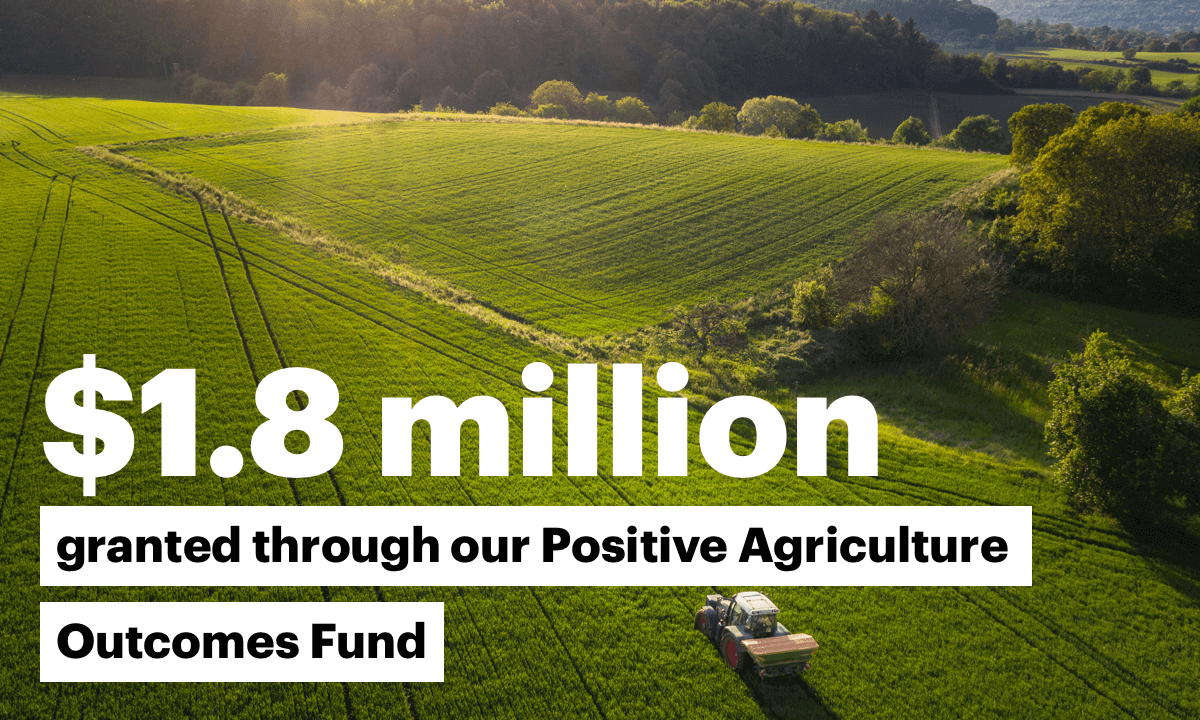
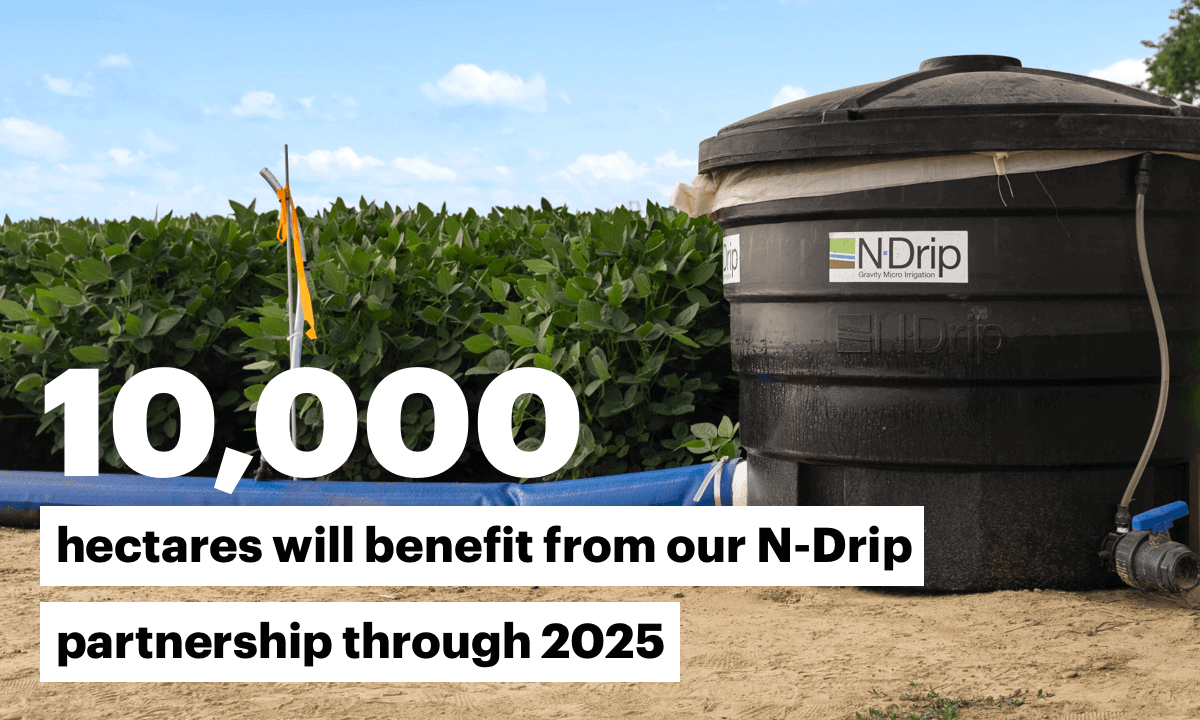
Around the world, it is a common practice to use flood or trench irrigation to bring water to crops, causing farmers who use these methods to potentially lose up to 70% of the water used to runoff or evaporation. In the search for a better solution, we partnered with N-Drip, an Israeli company whose irrigation system is powered by gravity and harnesses the water-saving benefits of high-pressure drip irrigation without the need for the energy costs and water filtration associated with high-pressure drip irrigation. PepsiCo aims to scale N-Drip's technology to help improve farmer livelihoods with higher yields, reduced water consumption and reduced GHG emissions. The goal is global adoption of N-Drip water efficiency technology across 10,000 hectares (25,000 acres) by 2025. In 2022, we plan to expand N-Drip in India, South Africa and the United States as well as kick off a pilot in Greece. The N-Drip cost-share project in India was made possible as a result of a grant from the Positive Agriculture Outcomes Fund.
Sustainable sourcing goal
![Sustainably source 100% of our key ingredients, expanding to include not only our grower-sourced crops (potatoes, whole corn and oats), but also key crops from third parties, such as vegetable oils and grains. [footnote #1], [footnote #2]](https://usa-pepsicoredesign-global-prod.pepext.com/images/default-source/sustainability/2021-esg-summary/pepsico_esg21_chart_agriculture-sustainable-sourcing-goal.png)
2. Cane sugar: Results reflect the exclusion of SodaStream and Pioneer Foods.
Approach
We’re already using sustainably sourced ingredients in many of the PepsiCo products consumers know and love. We’ve established sustainable sourcing standards as a baseline expectation for our agricultural suppliers, and we’re supporting farmers in making the transition to more sustainable approaches. These efforts aim to ensure a secure supply of key ingredients while helping improve the livelihoods of farmers in our supply chain.
Around 50% of the volume of our key ingredients are bought directly from farmers through a grower group (“grower-sourced”), while there are multiple tiers between the farmer and PepsiCo for the other approximately 50% (“supplier-sourced”).
Toward our 2030 goal of reaching 100% of sustainably sourced key ingredients, in 2021, we achieved more than 90% on grower-sourced crops as we continue to engage our main suppliers globally.
To achieve our goals, we engage suppliers through two approaches:
- High-risk approach: requires high-risk commodities (palm, cane and soy) and commodities grown in high-risk markets to be verified/certified to a sustainability standard recognized by PepsiCo.
- Low- and medium-risk approach: consists of working with suppliers to adopt a continuous improvement model, requiring them to demonstrate active work and progress toward outcomes by 2030.
These efforts seek to ensure a secure supply of key ingredients while helping improve the livelihoods of farmers in our supply chain.
We supported farmers in making the transition to more sustainable approaches:
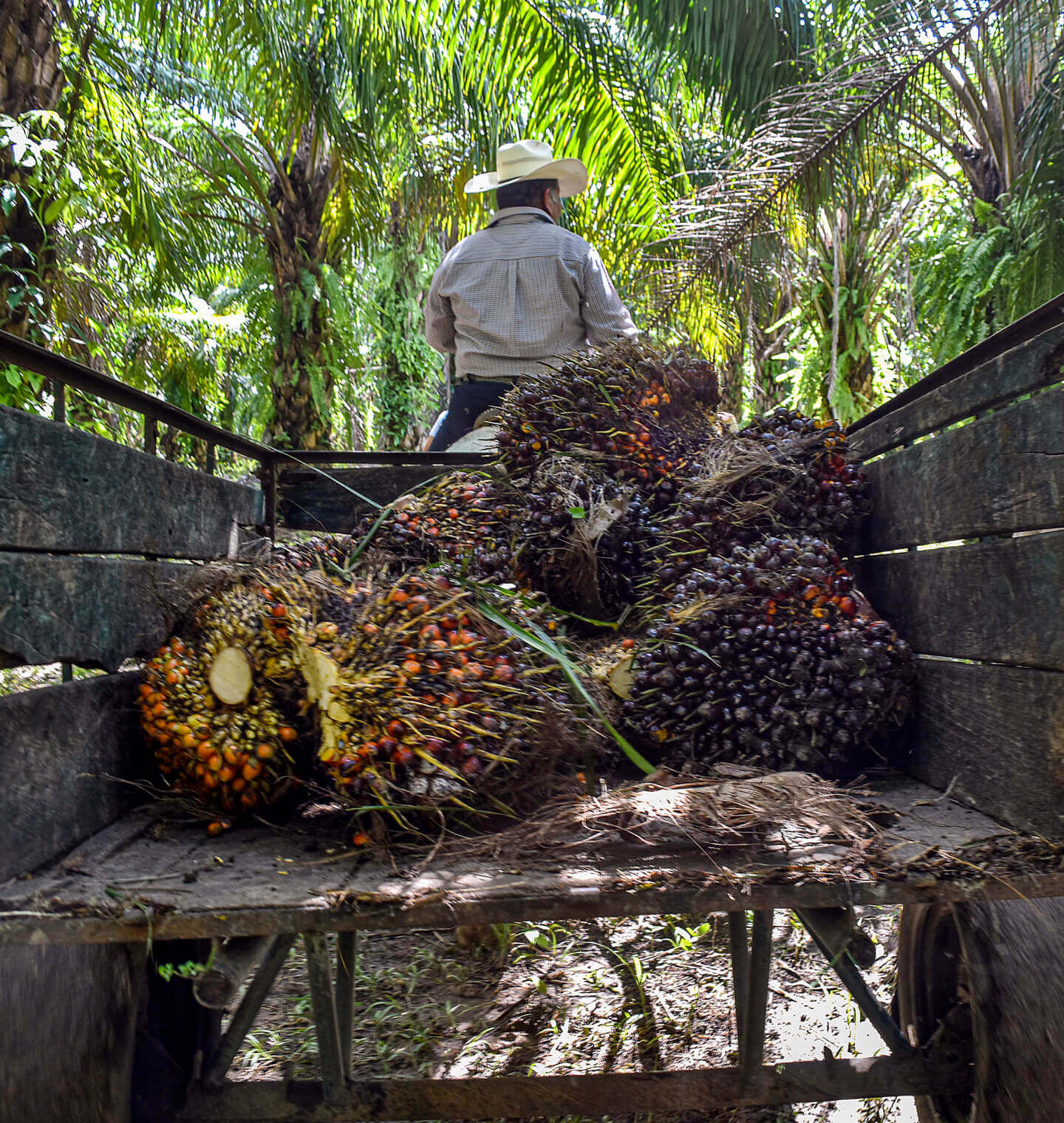
Mexico
In 2021, in Mexico, PepsiCo partnered with a supplier to pilot the Bonsucro Smallholder Standard, which resulted in 25 smallholder producers becoming certified — among the first in the country.
Southeast Mexico
In 2021, in Southeast Mexico, we launched Agrovita, a collaborative effort to strengthen the technical capabilities of 1,000+ smallholders to implement regenerative agriculture, increase women empowerment and reduce smallholder carbon footprint.
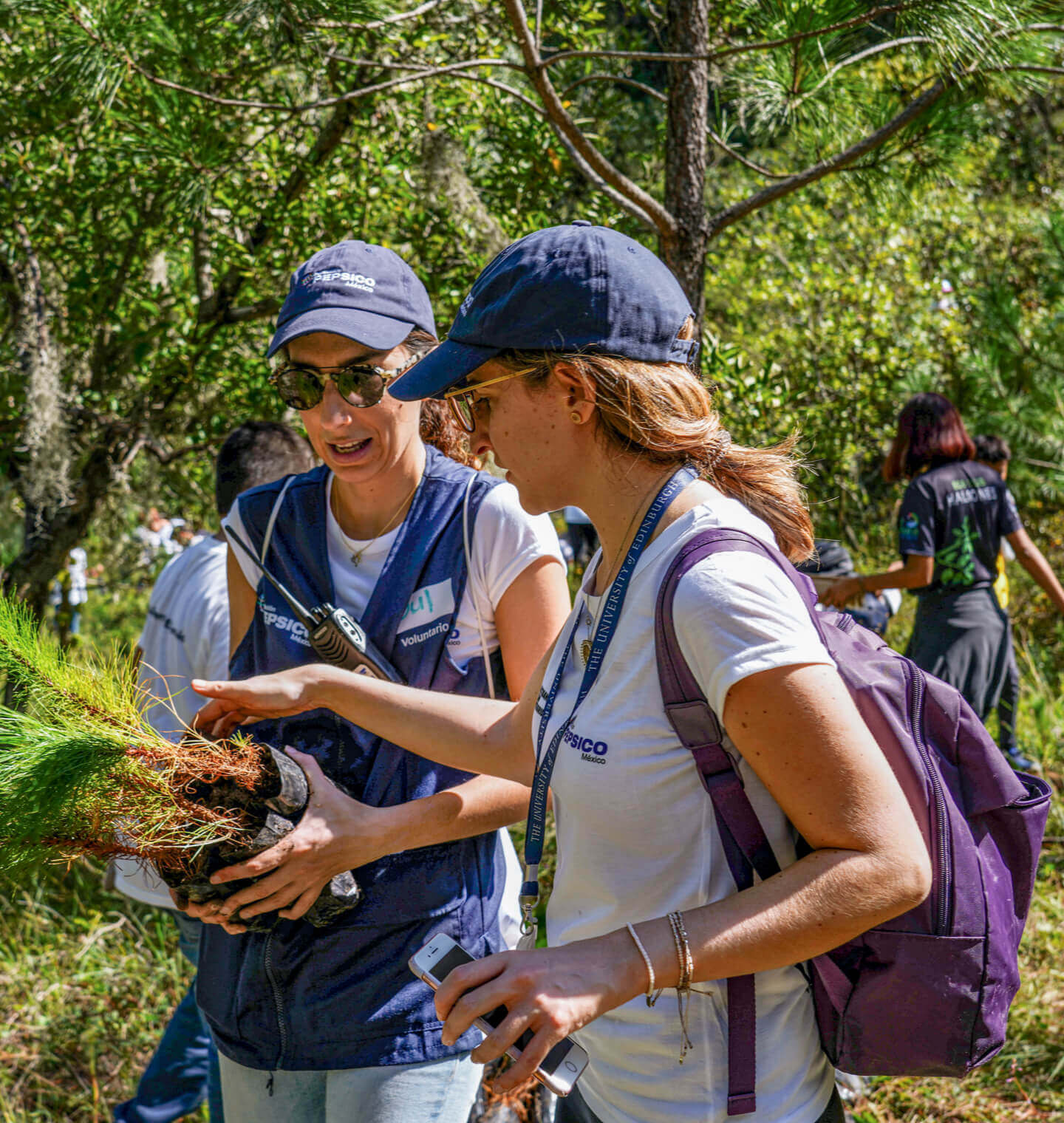
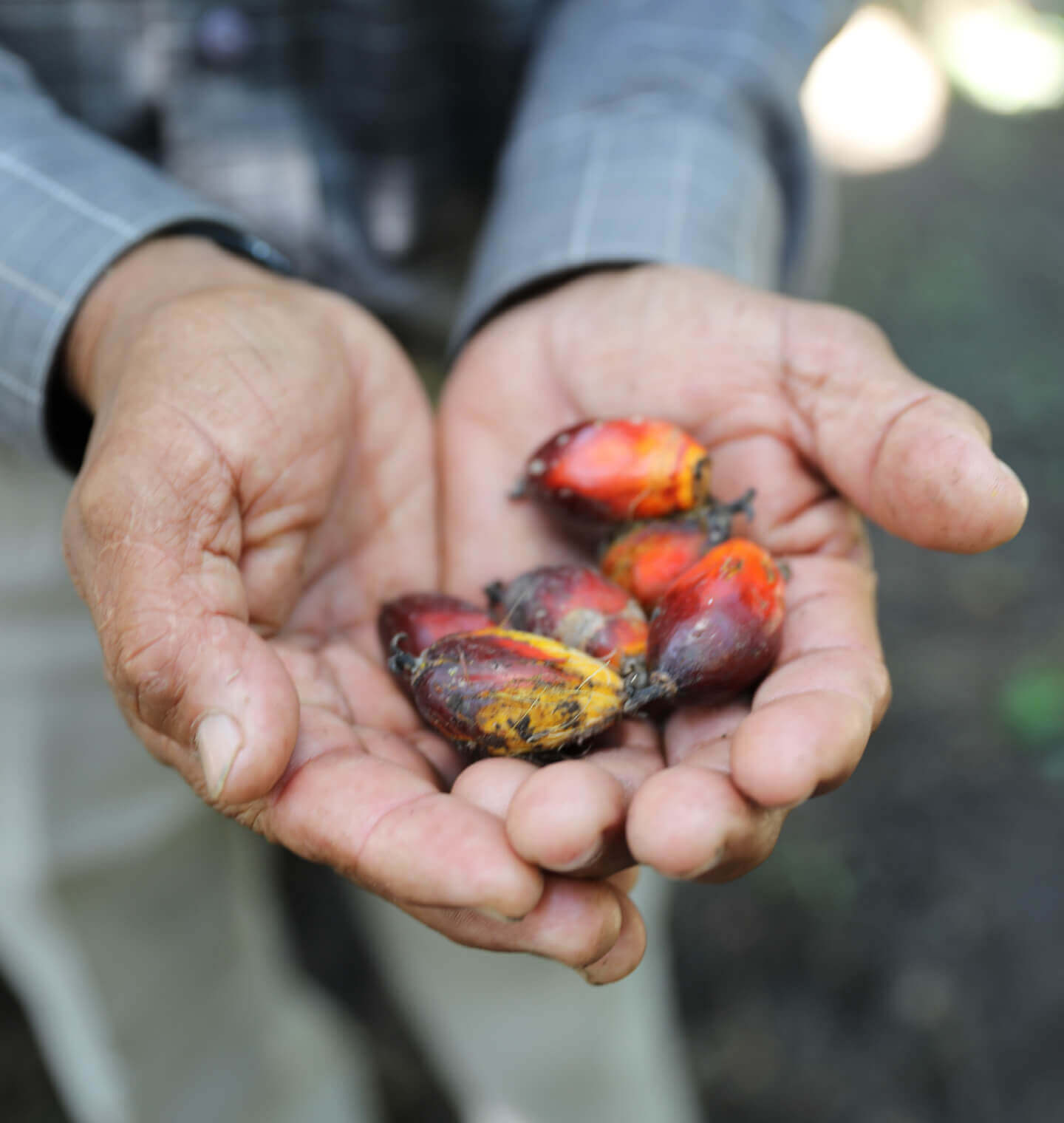
Southeast Asia
In 2021, in collaboration with leading palm oil players, we launched the Rimba Collective — the largest private sector-enabled forest conservation initiative in Southeast Asia for palm oil, to deliver $1 billion for forest conservation and restoration.
Positive Ag Supplier Playbook
In 2022, we launched a Positive Ag Supplier Playbook at our Supplier Summit, a public resource for buyers and suppliers to activate the goal across our entire key ingredient footprint.
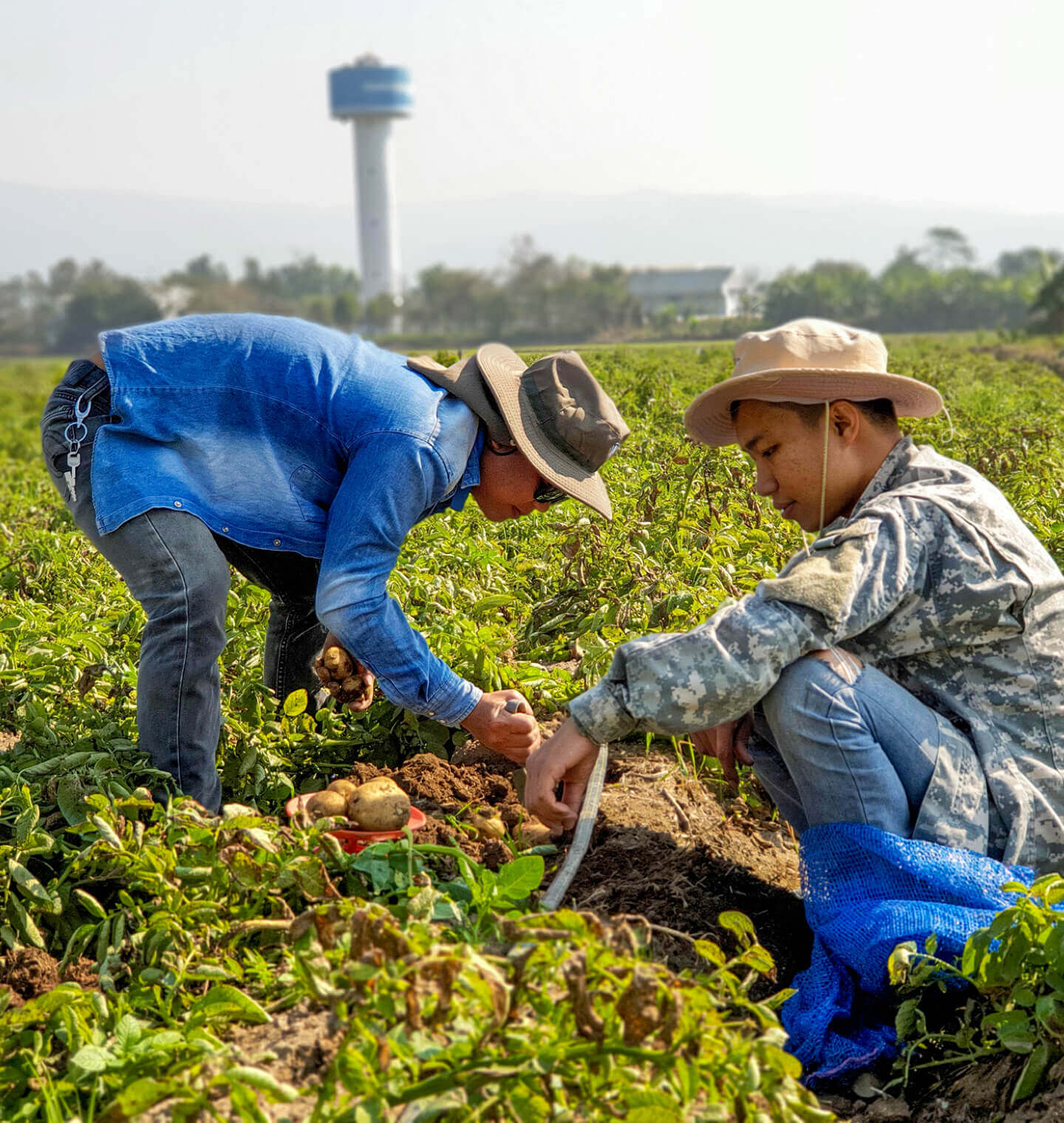
Improving livelihoods goal

Approach
People are the foundation of the world’s food system and our business. To ensure the long-term health of both, it’s essential for agricultural workers to earn a wage that enables them and their families to grow and thrive. Yet that’s not always the reality in many parts of the world.
We support the advancement of farming practices to optimize crop yields, respect human rights and plan to improve the livelihoods of more than 250,000 people in our agricultural supply chain and communities by 2030. This includes economically empowering women. We’ve focused our efforts on our most vulnerable farming communities, including smallholder farmers and farm workers, women and minority farmers.
Women farmers make up about 40% of the agricultural workforce in developing countries but are often denied key resources that could help them prosper. These resources include, among others, access to land, livestock, education, financial services, agricultural advisory services, technology and rural employment. If women had equivalent resources, it is estimated they could increase their yields by 20–30% and increase the agricultural output of their countries by up to 4%, potentially reducing the number of hungry people in the world by 100 million or more.
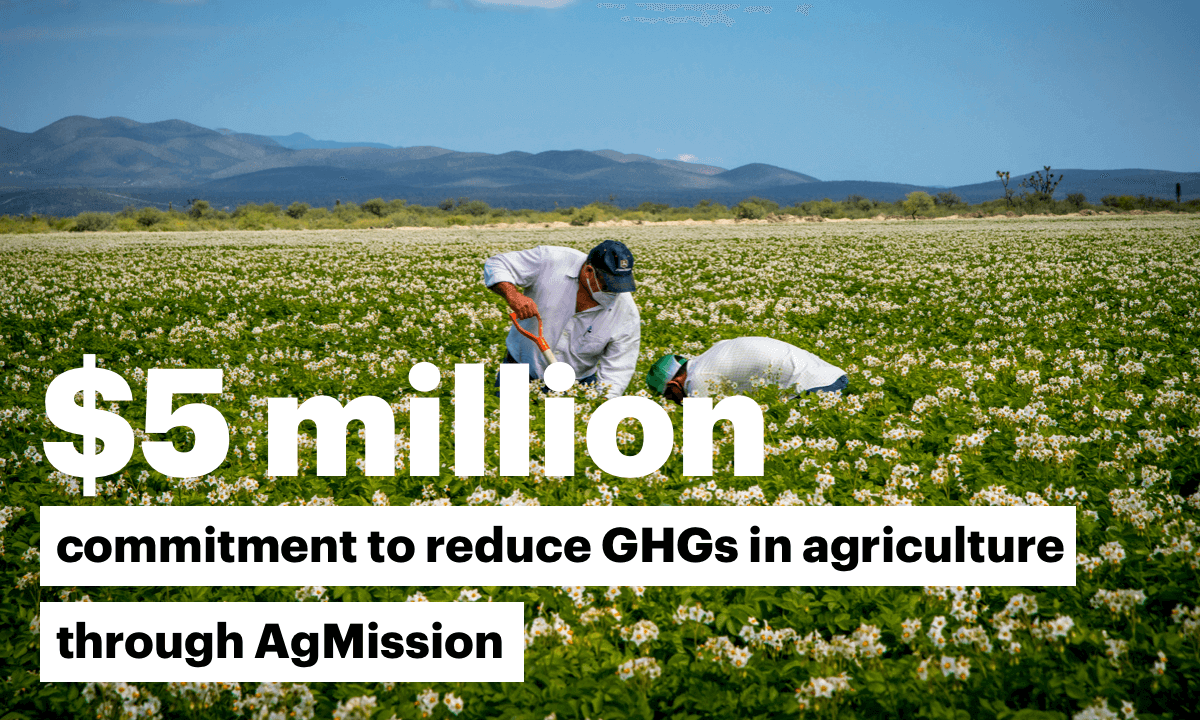
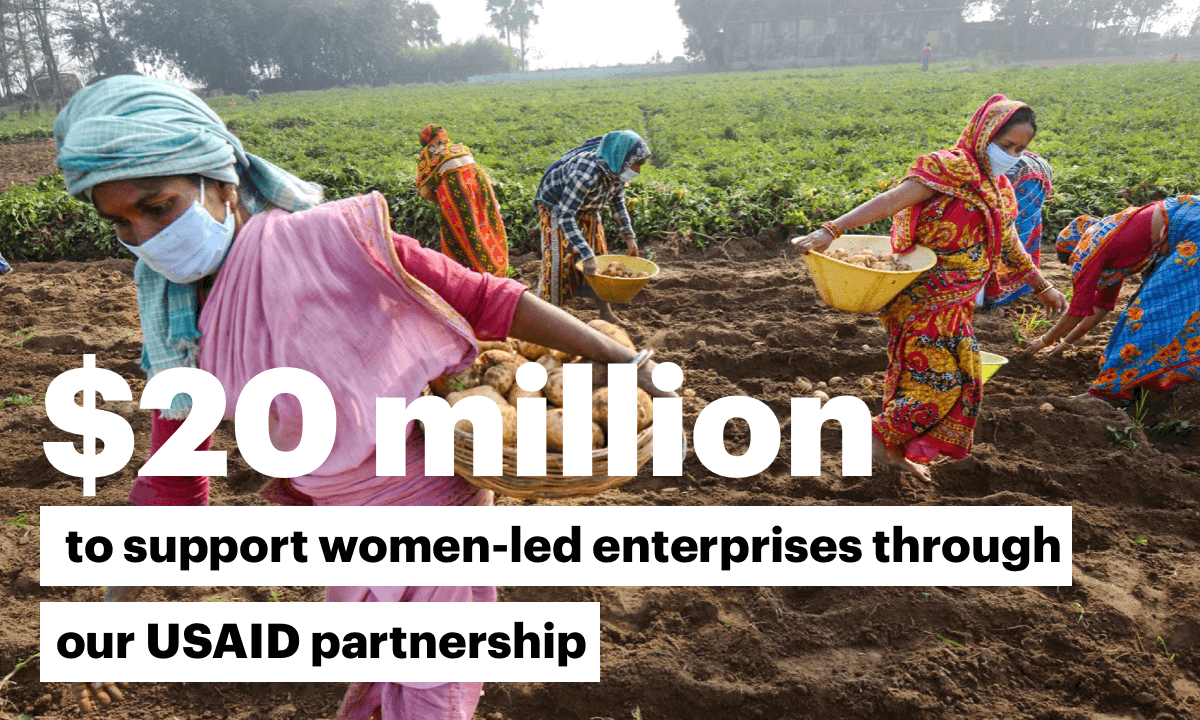
On this matter, we are drafting the livelihood measurement outcome indicators to track the number of livelihoods improved in PepsiCo's agricultural supply chains and communities. The indicators are designed to be relevant across different crops, scale of operations and geographies.
PepsiCo and the PepsiCo Foundation promote greater diversity and inclusion in farm management, including support for female farmers and people of color, through partnerships with organizations like the U.S. Agency for International Development (USAID), Inter-American Development Bank (IADB), CARE and the National Black Growers Council.
In 2021, we continued working with USAID on a 5-year, $20 million partnership to support women-owned and women-led enterprises among PepsiCo suppliers in rural farming communities in Asia, the Middle East and Latin America. The programs will improve resiliency in these communities and show that inclusivity leads to better business results.
We launched the Next Generation Agriculture Fund with the IADB, a partnership in which we aim to test and demonstrate the impact of gender-smart solutions along our agricultural supply chains in Dominican Republic, Ecuador and Guatemala. This three-year, $2 million partnership between PepsiCo LatAm Corporate Affairs, the Global Sustainability Office’s Agriculture team and the IADB includes an innovative talent acquisition and development program, as well as field activities that pilot the use of inclusive and gender-smart solutions that enhance farmers' resilience and contribute to PepsiCo’s Positive Agriculture goals.
Our promotion of regenerative agriculture techniques and support for open-source agricultural technology and information also helps improve farmer livelihoods. Regenerative practices can help farmers increase yield, leading to higher margins and greater profitability. Our support programs, such as cost-sharing for cover crops and peer-to-peer learning at our demonstration farms, help farmers ease the transition.
Support for open-source agricultural technology and information can have a similar impact. We worked with Corteva Agriscience to sequence an entire oat genome and made it publicly available to enable the creation of more resilient, productive and profitable varieties.
In addition, we became a founding partner of AgMission, an unprecedented initiative to reduce GHG emissions in agriculture with a $5 million commitment to expand our efforts toward creating a more sustainable planet.
Across the board, we see bilateral, multilateral and pre-competitive partnerships as critical to the ongoing success of pep+, the achievement of our 2025 and 2030 goals and the overall resilience and sustainability of our key supply chains. They are instrumental in leveraging and mobilizing a wide range of technical and financial resources that support farmers as they make the transition to more regenerative and inclusive practices, ones that will contribute to improved environmental and social outcomes. We cannot achieve these ambitious sustainable business objectives without these collaborations across supply chains, geographies, industries and sectors.
Explore Agriculture topics in more depth
PepsiCo's ESG Topics A-Z resource provides detail on strategy, data, policy, progress and more on a wide range of subjects.
Positive Agriculture stories
The PepsiCo Foundation Partners with CARE to Tackle Gender Inequality in Agriculture with an $18.2 Million Investment in She Feeds the World
Learn more.png)
